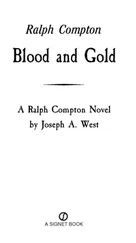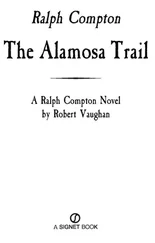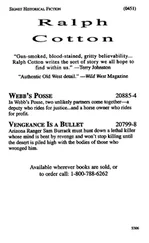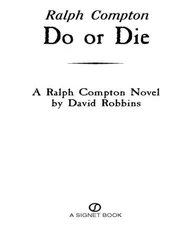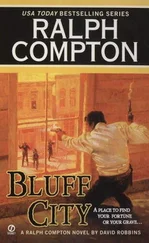Ralph Compton - West of the Law
Здесь есть возможность читать онлайн «Ralph Compton - West of the Law» весь текст электронной книги совершенно бесплатно (целиком полную версию без сокращений). В некоторых случаях можно слушать аудио, скачать через торрент в формате fb2 и присутствует краткое содержание. Год выпуска: 2008, ISBN: 2008, Издательство: Thorndike Press, Жанр: Старинная литература, на английском языке. Описание произведения, (предисловие) а так же отзывы посетителей доступны на портале библиотеки ЛибКат.
- Название:West of the Law
- Автор:
- Издательство:Thorndike Press
- Жанр:
- Год:2008
- ISBN:9781410409225
- Рейтинг книги:4 / 5. Голосов: 1
-
Избранное:Добавить в избранное
- Отзывы:
-
Ваша оценка:
- 80
- 1
- 2
- 3
- 4
- 5
West of the Law: краткое содержание, описание и аннотация
Предлагаем к чтению аннотацию, описание, краткое содержание или предисловие (зависит от того, что написал сам автор книги «West of the Law»). Если вы не нашли необходимую информацию о книге — напишите в комментариях, мы постараемся отыскать её.
West of the Law — читать онлайн бесплатно полную книгу (весь текст) целиком
Ниже представлен текст книги, разбитый по страницам. Система сохранения места последней прочитанной страницы, позволяет с удобством читать онлайн бесплатно книгу «West of the Law», без необходимости каждый раз заново искать на чём Вы остановились. Поставьте закладку, и сможете в любой момент перейти на страницу, на которой закончили чтение.
Интервал:
Закладка:
Shannon cowered among the shadows, her horrified eyes on McBride. He stepped to the fire and kicked Donovan’s smoldering coat sleeve from the flames.
Donovan’s eyes rose to McBride’s. ‘‘Damn you,’’ the man snarled. ‘‘Damn you to hell, McBride.’’
McBride nodded. ‘‘Keep a seat warm for me, Sean.’’
Donovan’s mouth opened to speak, but his lips pulled back from his gritted teeth in a death agony. He rattled deep in his chest, trying to kill McBride with his glare, and then his life left him.
Swinging his gun on Shannon, McBride said, ‘‘Let me have the bulldog, Shannon. I don’t want to kill you.’’
The woman had an arm behind her back and McBride watched her closely. ‘‘Don’t even try it, Shannon,’’ he said. ‘‘I have others close behind me. Even if you kill me, they’ll track you all the way to Las Animas and beyond if they have to.’’
‘‘What will they do to me?’’ the woman asked. All of a sudden, she looked scared, unsure of herself.
McBride shook his head. ‘‘I don’t know. Inspector Byrnes will take you to the law and then it will be up for a jury to decide.’’
‘‘A jury!’’ Shannon almost spit the words. ‘‘They could put me away for years.’’
‘‘Yes. A long, long time.’’
‘‘I can’t let that happen.’’ Shannon stepped closer to McBride. She was smiling. ‘‘John, you can forget what happened between us. That . . . that was all a mistake on my part. We can leave—we can leave right now and be together just like you planned. I was wrong, I know it now. Please, John, give me another chance. I can make you happy, I know I can.’’ Her smile was warm, wonderful. ‘‘I will make you a good wife, John.’’
McBride’s smile was without humor. ‘‘A wife who did her best to kill me back there at the saloon?’’
‘‘I didn’t try to kill you. I aimed wide on purpose.’’
‘‘I’d say that’s real good shooting,’’ McBride said drily. He saw a small defeat in Shannon’s eyes as she opened her mouth to speak, but he cut her off. ‘‘You made a sap of me once, Shannon. I won’t let it happen again.’’ He motioned with the barrel of his Colt. ‘‘Now, let drop whatever you’re holding behind your back.’’
‘‘There are no second chances with you, McBride,’’ the woman said. ‘‘Are there?’’
‘‘Not tonight, Shannon. Or any other night.’’
‘‘I thought so. Well, I can’t allow you to let me rot in a prison for forty years.’’
The .44 bulldog came out quickly from behind Shannon’s back. McBride hesitated, reluctant to shoot.
That was all the time she needed. Shannon shoved the muzzle of her gun between her breasts and pulled the trigger. She gasped and fell backward and McBride crossed the ground fast, taking a knee at her side.
‘‘I’d die a little death every day in prison,’’ she whispered, blood red against the paler pink of her lips. ‘‘I won’t let that happen.’’ She raised a hand and her fingers lightly touched McBride’s cheek and she smiled. ‘‘You poor sap,’’ she said.
She died, leaving a void in McBride’s heart that he knew he would never fill, not if he lived for a hundred years.
He was still kneeling beside Shannon’s body the next morning when Inspector Byrnes and another detective lifted him gently to his feet and led him away.
‘‘Are you sure you won’t come back to New York with us, John?’’ Inspector Byrnes asked.
They were standing on the platform of the High Hopes train station, surrounded by a hundred females that Byrnes had taken under his wing, vowing to find good homes for all of them back along the line.
McBride shook his head. ‘‘No, Inspector, for me that life is over and there’s no going back. The West has changed me. For better or worse, I haven’t discovered yet.’’
‘‘But surely you don’t intend to stay in High Hopes?’’
‘‘With Trask and Donovan gone and the Golden Garter closed, High Hopes is finished as a town.’’ He shrugged. ‘‘Maybe they can save it by attracting the cattle trade. I don’t know.’’
‘‘But what will you do, John?’’ The inspector’s eyes moved to the end of the platform where the mustang was tied, a blanket roll behind the saddle. ‘‘Just ride here and there on that ugly horse?’’
‘‘That’s about the size of it, Inspector.’’ McBride smiled. ‘‘But first I have to find a home for four young Chinese girls I left behind me. That might take time.’’
‘‘Huh, you think that’s hard? Try finding homes for a hundred caterwauling females.’’
‘‘Good luck, Inspector, and give my thanks again to the men who came here to help.’’ McBride took off the money belt Byrnes had returned to him and handed it to the man. ‘‘There’s around six hundred dollars there. Make sure Mrs. Stanton gets it.’’
‘‘But, John, that’s every penny you have.’’
‘‘I’ll make out,’’ McBride said.
Later, after the train left with Byrnes and his girls, McBride swung into the saddle and headed west.
The sun had begun its climb into the sky, heralding the dawn of a bright new day.
HISTORICAL NOTES
Detective Inspector Thomas Byrnes created the first New York Detective Bureau on May 25, 1882. Byrnes hired forty detective sergeants at an annual salary of one thousand dollars and ordered them to use their powers of deduction rather than brute force to solve crimes. Something of a Sherlock Holmes himself, Byrnes later became a major dime novel hero who handily outsold his closest rival, Theodore Roosevelt.
In the late 1860s and throughout the next fifteen or twenty years, ‘‘orphan trains’’ were dispatched west from Chicago, New York, Boston, St. Louis, Cleveland and Cincinnati. Funded by charities and religious organizations, the trains were packed with hundreds of children under the age of fifteen, removed from overcrowded city orphanages. In most cases this worked out well for all concerned, but many kids fell into the hands of pedophiles, pederasts and other perverts. Many were beaten to death by cruel adoptive parents or by people who posed as parents but were truly little more than task-masters.
Some readers, especially those familiar with film noir, might be surprised at the use of the word ‘‘sap’’—as in fool or simpleton—in an 1880s context. The word was widely used in its present meaning as early as 1815, and probably grew out of the earlier word ‘‘sapskull,’’ a thick or stupid person.
The railroad yard in the opening chapter of West of the Law is now the site of Grand Central Station.
Heroin was first synthesized from morphine (a derivative of opium) in England in 1874. By the mid-1870s it was being imported in fairly large quantities from Britain and Germany to the United States, where the drug was touted as a ‘‘safe, non-addictive substitute for morphine.’’ It was then that the heroin addict was born.
The hypodermic needle was invented in 1853 by Scottish doctor Alexander Wood. By the late years of the War Between the States the needles were in widespread use to administer morphine to wounded soldiers. Morphine had been used as early as the War of 1812, but was given orally. One result of battlefield morphine was that many soldiers went home with an addiction, taking their needles with them.
The author is convinced that heroin was being mainlined in the West in 1882, but had not yet replaced the easier to get laudanum. When he researched what heroin was called back then, he hit a brick wall. It could be that the soiled doves and other addicts of Deadwood and Tombstone called the drug ‘‘heroic’’ or ‘‘heroic medicine.’’ But it’s more likely that it was already called heroin and that’s the name that was later trademarked by the Bayer Company in the 1890s. Overall, the author feels comfortable portraying his Chinese doves shooting up heroin with hypodermics in 1882, and that they and their handlers call the drug by that name.
Читать дальшеИнтервал:
Закладка:
Похожие книги на «West of the Law»
Представляем Вашему вниманию похожие книги на «West of the Law» списком для выбора. Мы отобрали схожую по названию и смыслу литературу в надежде предоставить читателям больше вариантов отыскать новые, интересные, ещё непрочитанные произведения.
Обсуждение, отзывы о книге «West of the Law» и просто собственные мнения читателей. Оставьте ваши комментарии, напишите, что Вы думаете о произведении, его смысле или главных героях. Укажите что конкретно понравилось, а что нет, и почему Вы так считаете.

